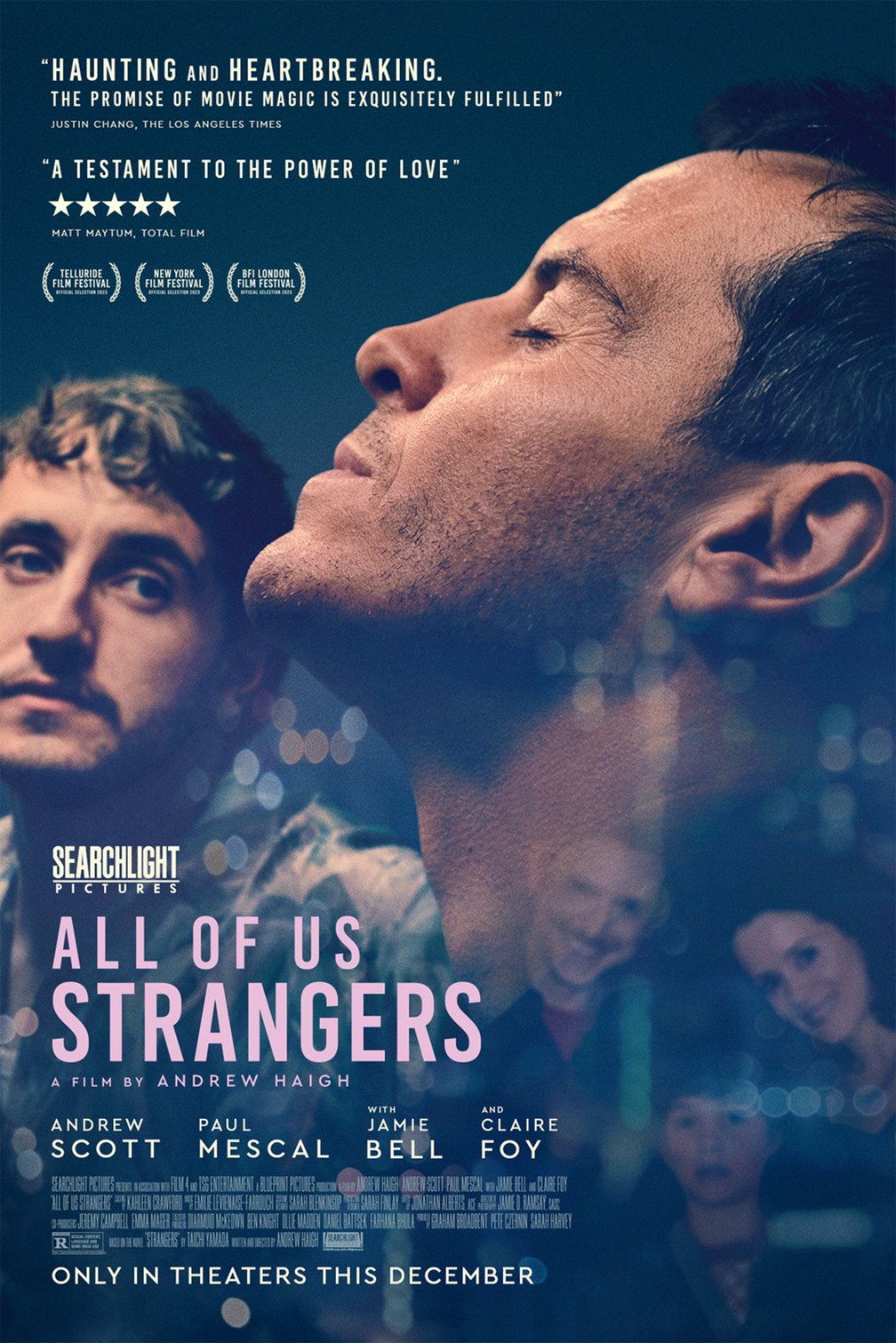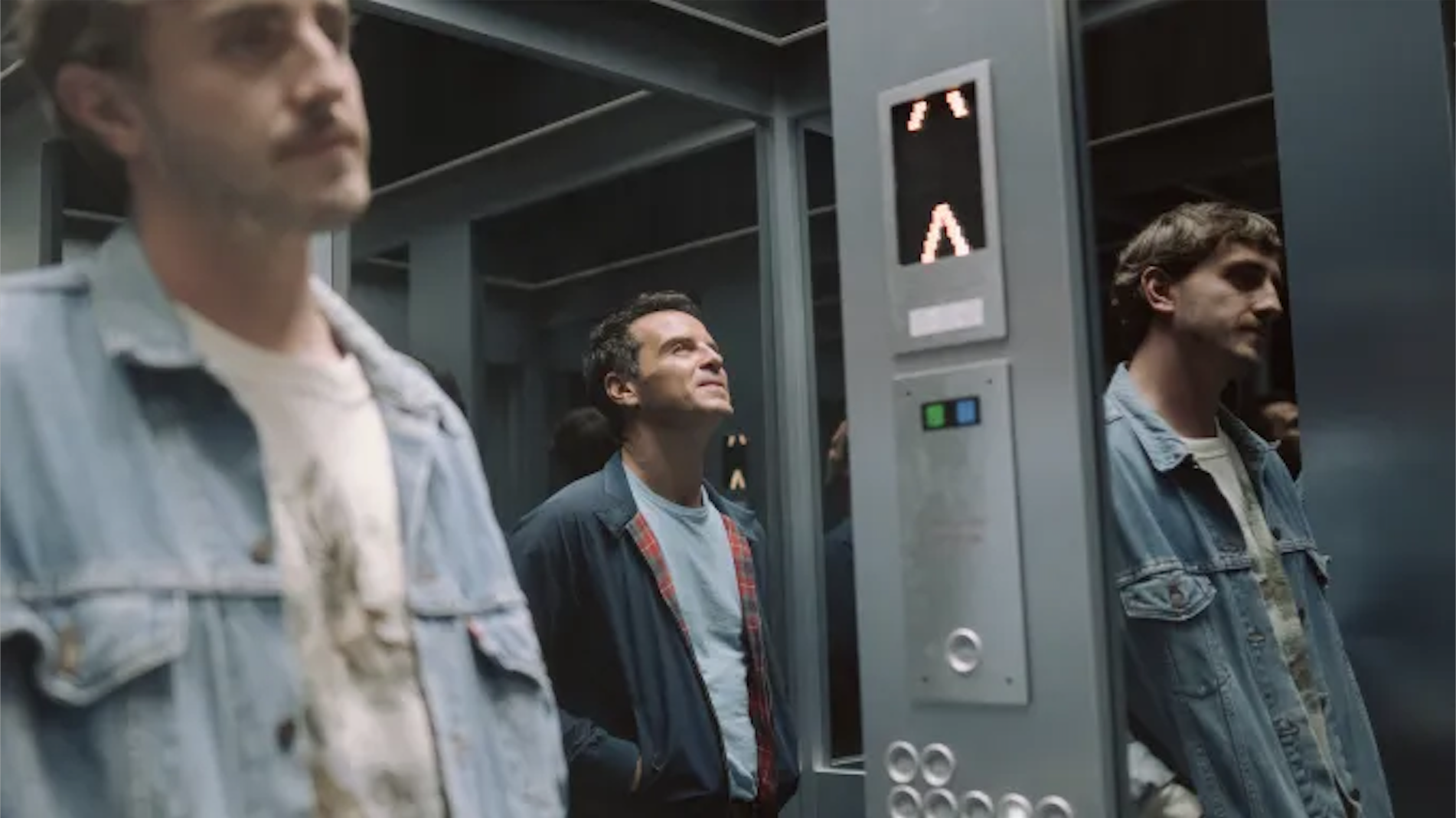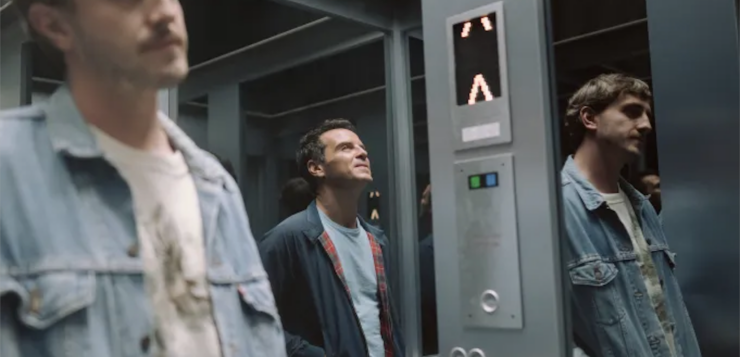 ALL OF US STRANGERS
ALL OF US STRANGERS
Directed by Andrew Haigh
Searchlight Pictures
SCREENWRITER SITS in a dark apartment in a high-rise in London, trying to write about his childhood. Desperate for inspiration, he decides one day to take the Tube (subway) back to the house in which he grew up. When he arrives at his boyhood home, he discovers that his parents, who died in a car crash when he was twelve, are living there. They are unchanged. He goes inside and they serve him dinner, and he fills them in on what has happened since they died. Such a simple idea, and one that gets more profound as it goes along.
The loneliness that drenches, soaks, All of Us Strangers is established at the start. The high-rise in which Adam, the handsome, blocked, middle-aged writer (played by Andrew Scott) lives seems to have no other residents but him. When a fire alarm goes off, he alone leaves the building and walks out into a meadow. When, back in his room, he hears a knock on his door, he finds there a young man named Harry (Paul Mescal) who tries to invite himself in, telling Adam that he is always alone, that he’s never seen Adam with anyone. Adam declines the invitation to trick, and closes the door.
Everything in this film conspires to convey a profound sense of isolation: the city beneath his window that looks so far away, a small cluster of skyscrapers breaching a green canopy of trees, the strangers on the train he takes to visit his childhood home in the hope that something there will inspire him. The premise—that Adam’s parents are still the age they were on the day of their fatal car crash—means that they and their son can talk to one another over meals, or while decorating the Christmas tree, or even when sharing their bed after Adam puts on his childhood pajamas and climbs into bed between them. Adam’s father (Jamie Bell) is a handsome clone—if nothing else, this film should bring back the moustache—his mother (Claire Foy) a pretty woman who seems satisfied with the way her son has turned out, until Adam reveals that he is gay, which triggers a barrage of questions. Things have gotten better, he assures her, for gay people; two men can even marry each other. (“Why?” his mother shouts.) The confrontation between Then and Now allows Adam to unload a lot of baggage. Soon enough, when he returns to the high-rise, he begins to have sex, and post-coital conversations, with Harry. They even go to a disco together.
There are other autobiographical elements. The soundtrack includes songs that brought him solace when he was growing up in England during more homophobic times; Haigh’s parents divorced when he was about the age that Adam was when his parents died in a car crash—another version, you might say, of a fatal accident in a child’s eyes. The movie is based on a Japanese novel called Strangers, by Taichi Yamada, who worked with Haigh on the screenplay but died, at the age of 89, shortly before the film was released. In the novel, the other person in the building is a woman, not a man. It was presumably Haigh’s idea to turn the heterosexual pair into two gay men, and the payoff is enormous.
Everything in All of Us Strangers—the music, the cinematography, the sets, even the darkness and twilight in which the movie mostly takes place—is so beautifully done; it’s no surprise that this story came originally from Japanese culture. Everything is stylized. We don’t question why Adam and Harry are the only two people who seem to be living in the high-rise. I didn’t even know it was London until I read a review afterwards. We don’t know where we are when the Tube breaks into the sunlight while going by a lake ringed with high-rises. Time, place, weather—almost always crepuscular—are all in service of a melancholy mood that pulls us in. Walking out of the theater at three thirty in the afternoon into a sunny parking lot of a Florida shopping mall could not dissipate what I’d just seen.
All of Us Strangers has only two locations (the high-rise and the house) and four actors—but how deep it goes! Part of its depth is the idea of airing one’s childhood anxieties and secret sorrows to one’s parents beyond the grave, after the Sturm und Drang of childhood is over. But what All of Us Strangers is about above all is loneliness—a specifically gay loneliness, I think—not only the feeling of being an outsider in grade school, subject to bullies who give you female nicknames (how soon they introduce us to drag!), but also hiding the persecution from one’s parents for fear that they may discover the reason for the bullying. It is this secret that the young Adam must live with, the one that separates him from his father, that estranges him from the family, that makes one wonder: Is the car crash just another way to lose them, when the real cause is their knowledge of his homosexuality?
The final thing Adam does with his parents is to have lunch with them in a diner; but when he decides to take his new boyfriend over to the house to meet them, they refuse to let him in. Our final glimpse of the dead couple reveals a pair of figures beyond the window rapidly fading into nothingness. The idyll is over—for what reason I’m not sure. Do the parents withdraw because their purpose has been served, because Adam is moving on now that he has found someone and is no longer alone? Or because they disapprove of the actuality of their gay son having a boyfriend? One can only speculate—and on other matters as well. At the very end, when Adam realizes his parents are no longer accessible to him, have left the house and will never appear again, he goes back to his apartment building, knocks on Harry’s door, and discovers that Harry is not only dead but giving off an odor as he decomposes in his bed. Then Adam goes into the kitchen and there is Harry, still alive.

I so wanted a happy ending for this movie that I decided I’d been confused in thinking Adam had discovered Harry’s corpse and that the two of them were going to survive and live happily ever after. I drove home that day, in fact, thinking there was no getting around what movies are—fantasies—since most of us do not have a Paul Mescal waiting for us, dead or alive, when we get home in the evening. Such is the reality, not the fantasy, of gay life. And when I got home—to find not Paul Mescal but the Internet on which I could read reviews of All of Us Strangers—I came upon one critic’s speculation that not only were Adam’s visits to the parents a daydream, but so was the affair with Harry. In reality, not only was Harry dead, but he’d died the night Andrew turned him down when Harry first knocked on the door. This, of course, made the ending even more depressing. They’d never even had the affair, the night out at the disco, the post-coital conversations. Andrew’s rejection had led either to Harry’s accidental death or to his intentional suicide by pills.
But then the movie takes another turn: the final image is of Adam in bed with Harry, both of them in the fetal position, spooning as they sleep. A minute after that, a small dot of light moves from their sleeping forms to the universe itself, the galaxy in which we live, in which they become yet one more point of light, decomposed, returned to the cosmos in which we are all $1.87 worth of chemicals when finally broken down. Cold comfort, lovely image. In the end, All of Us Strangers is so profoundly bleak that I thought of Brokeback Mountain, another movie that depends on a final scene for its impact to really be felt.
Brokeback Mountain does not resemble Haigh’s movie at first glance. Its realism is grounded in a very concrete place and time, with real people herding real livestock. But at bottom they are both the same story: a love between men that cannot be. And, like Brokeback Mountain, All of Us Strangers seemed to me to move as slow as molasses. There is a heavy pace to both movies; the mills of tragedy grind exceedingly slow.
How Adam can be in bed with a dead Harry, their bodies carefully arranged in parallel poses, sleeping peacefully, cannot be explained. But it has its effect. The reviewer for The Guardian said she could feel her chair vibrating with the sobbing of her fellow critics in her row of seats. In that respect, Haigh has succeeded. For all the superb cinematography, the eroticism, and the mystery, this movie is, the more one thinks about it, an amazingly bleak look at gay life. The dream of meeting our parents again, of being able to have a discussion about the things that wounded us as children growing up, of reassuring them that things are better for gay people now, is, like the dream of having Paul Mescal knock on your door, pleasant to imagine. But what a vision the movie offers. And yet, despite the ending—the slowness, the darkness, the portrayal of human isolation—there is something bracing, something stinging, about Haigh’s film. It stings you back into feeling, into life—even when you have reached an age when most of the people in your past are, in fact, ghosts.
Andrew Holleran’s latest novel is The Kingdom of Sand.




